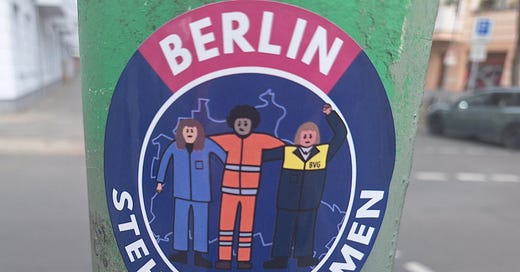#370: Another strike, 5 years Covid, tenant protection
Where do the best-paid Berliners live?
Dear 20 Percent,
On March 6, 2020 I went to an amazing The Feminists concert at Badehaus in Friedrichshain. A great show, which I fear was the band’s very last. The gig had a certain “dancing on the volcano” feel to it.
The first case of Covid-19 in Berlin was identified on March 1. An outbreak was traced to the Kreuzberg bar Trompete. By March 14, Berlin had ordered schools, culture venues, sport facilities, gyms, clubs and bars to close. On March 20, 2020 Berlin registered the city’s first coronavirus-related death.
My memories of the pandemic are patchy: lonely strolls with my toddler through empty parks; buying a cloth mask at my local tailor because Germany didn't have enough medical masks to go around; buying groceries for my mother, so that she wouldn’t have to step foot in a store; lots and lots of “home office” as the Germans say — not so strange for this freelancer; the Berlin government generously offering millions of euros to self-employed people affected by the pandemic.
Later, the test centres on every block; my corner bar transformed into a post-apocalyptic medical centre with familiar bartenders in plastic smocks sticking things up my nose.
The stages of lockdown all blur together: the weekly changing rules about what we could and couldn’t do; the QR-code menus; the useless virus-tracing apps; the switch to FFP2 masks.
Germany screwing up the corona stats because health officials were using Excel and fax machines.
Then there was the backlash. Tens of thousands of people took to the streets to protest the restrictions. On August 29, 2020, hundreds of “corona skeptics”, some carrying Reichsbürger flags, stormed up the steps of the German parliament. They didn’t get far, but the event foreshadowed the events of Janaury 6 in Washington, DC the following year.
It was a lot to go through. And we’re still feeling the consequences, including a strengthened AfD, who attached themselves to the Covid-skeptic movement.
Despite the confusing rules, the chaos, the social cost of the lockdown, the toll on kids and parents, I think it could have been a lot, lot worse. Hindsight is always 20/20.
How do you feel about Berlin’s handling of the pandemic five years on? Feel free to comment below.
Maurice
BVG strike #4
Wednesday and Thursday, the U-Bahn, trams and most bus lines will be out of service thanks to the fourth BVG transport strike this year. Labour union Verdi, which represents 2.5 million public sector workers (e.g. transport, daycare, sanitation) failed to reach a deal in a third round of talks on Monday. The union wants €750 more per month for all employees as well as an extra month’s pay, known as the 13th month’s pay in Germany. Some other bonuses for changing shifts are also up for debate. The union warns this may not be the last strike and is already threatening with unlimited action. But it’s not just BVG employees who are unhappy — a mediator is now supposed to help in a broader strike of public employees after the two sides repeatedly failed to reach an agreement (the reason for the recent BSR trash strike as well as strikes at Berlin utilities and hospitals). In other unpleasant transport news: the North-South S-Bahn line was out of service this morning between Oranienburger Straße and Nordbahnhof, thanks to a broken signal. Vast chaos ensued. I know, because it’s my commute. No news on when repairs will be completed.
More tenant protection?
Eigenbedarf - one of the most dreaded words in the German language. It translates as “personal use” and is used by landlords an estimated 10,000 times a year in Berlin to evict tenants. Eigenbedarf is one of main reasons rental contracts are cancelled. Often it’s because a landlord claims a family member needs the flat. Sometimes, Eigenbedarf is faked to be able to sell the apartment empty. Now, an alliance of local Green and SPD politicians has banded together to call for stricter national rules on Eigenbedarf: longer notice, limiting beneficiaries to immediate relatives, according to Tagesspiegel. Extraordinarily, a few local conservative CDU politicians are joining the cause.
Apartment for exploited workers
Berlin has set up a flat to house people who have suffered under exploitative work conditions, reports taz. The project targets immigrants without papers who have been subjected to human trafficking or inhumane labour conditions at construction sites, restaurants, or even nail studios. Employers lure people from abroad with promises of high wages but end up trapping them in exploitative labour and living situations. The apartment’s address is undisclosed, for obvious reasons, and is staffed by social workers to help the victims get back on their feet.
Events this week, curated by The Next Day Berlin
🖼️ Vaginal Davis – Fabelhaftes Produkt
Opening: Thursday, 20.03, 7 pm. Exhibition until 14.09. Gropius Bau, Niederkirchnerstraße 7. Tickets: €9 / reduced €6. The opening is free admission to the exhibition and a DJ set by Jimmy Trash.
Celebrating 20 years of Vaginal Davis in Berlin, this is the first major solo exhibition of her work in Germany. Across seven large-scale installations, it spans painting, film, zines, music, and performance, capturing her punk, queer, and Black countercultural legacy.
👩🎤Dirty Laundry. The TrashOpera
Friday, 21.03, 7 pm / Saturday, 22.03, 8 pm / Sunday, 23.03, 7 pm. EN with DE and EN surtitles. Moldavian Romanian & Russian. HAU 1, Stresemannstrasse 29. Tickets: €16-25.
A cruise ship becomes a stage for capitalist critique as hidden workers throw a rebellious party. Moldovan theatre maker Nicoleta Esinencu & teatru-spălătorie challenge societal norms in this radical sound-collage performance. As part of Every Day: Feminist Struggles in Post-Socialist Europe Festival.
🪩Disco Tehran – Nowrouz Edition
Friday, 21.03, 11:00 pm. Gretchen, Obentrautstraße 19-21, 10963 Berlin. Tickets: €15-35.
A multicultural dancefloor celebrating Nowrouz, the Iranian New Year, with live shows and global grooves. Expect a mix of Middle Eastern, African, Latin, and European sounds, blending nostalgic throwbacks with rare gems in a warm, vibrant setting. Don’t miss 🎧 Naghib Shanbehzadeh live. It can be insane. 🎧 Mirza 🎧 Prinzpfiffig
🔉Sunday, 23.03, 1:00 pm - 11:59 pm. Sonnenraum, Eichenstraße 4a. Tickets: €15.
A daytime trip into ethereal electronics and hypnotic techno.🎧 Skee Mask, 🎧 Spekki Webu, 🎧 Vlada, Erensu, and Vaahzer guide the journey from deep rhythms to atmospheric highs.
🍺 🥨 Germany-wide news 🥨 🍺
🦠German spy agency 'believed Covid likely started in lab'
💣Germany debates nuclear weapons
💰Parties agree on massive increase in state debt
Factoid
Oh, how things change: The parts of the city associated with punks and alternative culture have morphed into the most prosperous neighbourhoods. With a median gross monthly salary of €4,525 at the end of 2023, the good folk of Friedrichshain-Kreuzberg enjoy the highest pay for full-time work in the city. The self-employed were not included in the new stats released by the Berlin-Brandenburg Statistics Office. The denizens of Pankow come next with median earnings of €4,424. The city average was €3,955. The inhabitants of Marzahn-Hellersdorf lay at the bottom of the table with €3,314.
🪶🪶🪶Please visit our sponsor!🪶🪶🪶
Protect What Matters & Get €15 Cashback with Feather
Sorting out insurance in Germany can feel like a hassle - but it doesn't have to be. Whether you need legal support for a contractual dispute, protection for your home and valuables, or bike insurance for when Berlin's sticky-fingered thieves strike, Feather makes it simple and stress-free.
For a limited time, get €15 cashback when you sign up for any Feather insurance with the code 20BERLIN.
🚀 100% digital, 100% in English - No paperwork, no phone calls in broken German - just a quick and easy online sign-up.
🛡 Health, liability, legal, and more - With 15 different insurance options, Feather makes it easy to find coverage that fits your life in Germany.
⏳ Sign up in minutes - No hidden fees, no long-term contracts - just straightforward coverage when you need it.
A small monthly cost now could save you thousands later - plus, €15 back in your pocket doesn't hurt either.






Even if Berlin made some mistakes or did a few strange things during those pandemic years, I don't mind. It happens. It is what it is. The entire world was scrambling to do what they thought was right, while attempting to mitigate death & danger for everyone, and figure out practical solutions on the fly, including cloth masks or lockdowns or whatever. This is normal. No one is perfect. But they tried anyway - hopefully learning some good lessons.
What I am extremely tired of now is hearing all of the petty, absurd complaints about "But I had to wear a mask!" "Lockdown was so lonely!" "What the government did was tyranny!" Or whatever crap is coming out from certain people nowadays. Of course it was a lonely, sad time for almost everyone on the planet but that's not a valid complaint. All of this was entirely necessary in a world attempting to stop a virus that killed millions. And some petty discomfort about masks or about the disruption that lockdowns caused do not deserve to be heard, as this is just a regular part of that process and people need to accept it instead of getting louder & louder with their complaints in hindsight. Millions died! Wearing a mask was the least anyone could do! Same with lockdowns! Learning to adapt and deal with a majorly dangerous situation is an important part of humanity's resilience - that's something we should still be thinking about all these years later.
After having now lived here for five years, I've now concluded that the easiest and cheapest form of digitalization would be to give every German household a fax machine. (And then add the fax number to the resident's Anmeldung record.)
This started as a joke. But I'm 90% serious. A lot of digitalization solutions are expensive and complex and don't genuinely result in anything that much better than sending a fax.